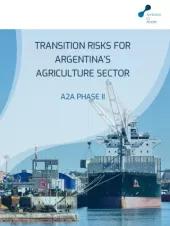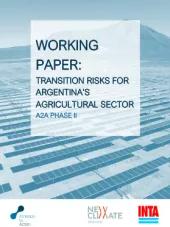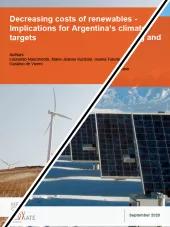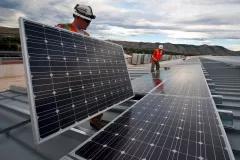The “Ambition to Action” (A2A) project provided support to the Argentinian NDC process between March 2017 and December 2019. This report provides a synthesis of the results of three years of supporting governmental and non-governmental constituencies with analytical support for the energy supply sector. At the core of the work were three strands. 1) Scenario analysis to support the understanding of the implication of the long term temperature goals of the Paris Agreement. 2) Analysis of socio-economic impacts of the energy transition, especially regarding employment and industrial development. And 3) a framework to help better understand the technical challenges of the energy transition in the power sector.
Conclusions:
Scenario analysis: Important modelling exercises have been conducted in recent years in Argentina to understand the future development of the power sector better. These were followed by a sector dialog around a 2050 vision for the sector. The implications of the long term temperature goals under the Paris Agreement were insufficiently addressed in both the modelling and the process. These will need to be considered better to future proof policies, steer investments in the right direction and help minimize carbon lock-in and stranded asset risks. Expanding and deepening the stakeholder driven dialogue on the challenge of long-term decarbonisation will be necessary to send the right signals to all relevant stakeholders. Linking the NDC process and targets to these long term implications ensures that the incremental bottom up NDC process does not lose sight of the ambitious end goal.
Socio-economic impacts: Important benefits can be realised in the transition of the economy. The analysis of employment and industrial development impacts in the power sector undertaken as part of this project highlight. For example, the power sector transformation presents opportunities for Argentina to seize regional (and global) technology leadership in the development and commercialisation of renewables-based hydrogen and synthetic fuels. The renewable energy sector will require new skills and provide higher quality, future-proof jobs compared to the fossil fuel sector. In contrast, communities which currently rely on fossil-based industries may need to be compensated and accompanied by policy interventions to ensure a socially just transition. Here again, it is critical to gain a deeper understanding of the wider socio-economic impacts of different pathways in order to enable policy interventions which maximise benefits and soften potential negative implications.
Energy transition: In the energy supply sector, in particular the power sector, the new Renewable Energy Law and the implementation of the RenovAR auction scheme have been important steps to increase the participation of renewable energy sources in the current system. The further integration of variable renewables (vRES) at increasing scale is important to drive the decarbonisation of the energy supply sector, which in turn is fundamental to decarbonise key demand sectors, in particular transport and buildings. A deep understanding of the challenges arising in the power system transformation process is important for the design of efficient and effective system operation tools and adequate policies to integrate higher shares of vRES. In the Argentinean case, grid limitations are the prominent short-term challenge to increase the participation of renewables in the system. However, other conditions, such as the availability of hydro resources and the existence of technology and practices already implemented in other systems should allow Argentina to integrate smaller shares of vRES with relatively little effort.








